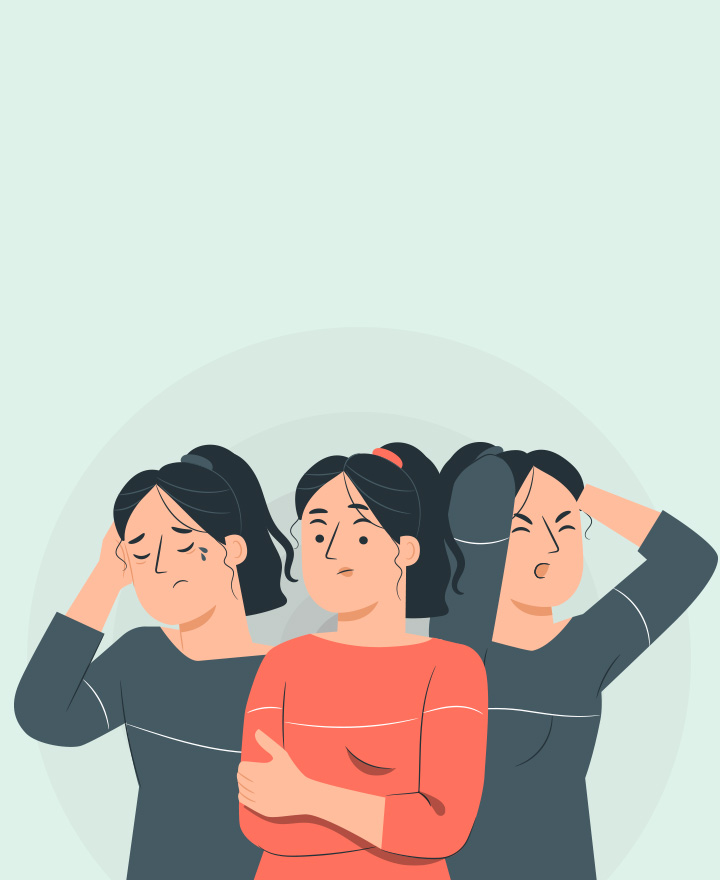

Types of Mental Illness
Mental health and overall well-being are closely interlinked, and it is as important as physical health. Mental health conditions encompass a wide range of concerns that affect the mood, thoughts, and behaviour of people afflicted with them. Biological, psychological, as well as social factors play a significant role in people developing mental conditions. With proper family support, professional therapy, medication, and the adoption of healthy habits, many people with mental illnesses manage to enjoy fulfilling lives. Understanding types of mental illnesses can help foster empathy and create a supportive environment. Read on to know more.
Causes of Mental Health Disorders
Mental illnesses should not be mistaken as a sign of weakness or personal failure. A complex interplay of biological, psychological, and social factors can cause them. Key factors that cause mental illnesses are —
• Biological factors:
These include genetics, brain chemistry, and hormone imbalances that play a significant role in mental health issues.
• Psychological factors:
These include negative childhood experiences, trauma, and stressful situations that can increase the risk of mental illness.
• Social factors:
These include poverty, isolation, and discrimination that can significantly impact mental well-being.
Types of Mental Illnesses
Mental illnesses can be of many types, and each of them can dangerously impact the mood, thinking, and behaviour of the person. Some common types of mental illnesses are:
• Mood Disorders:
These conditions affect people's emotions and can significantly impact their daily lives. Some common mood disorders include —
◦ Depression:
Persistent sadness, loss of interest, and sleep or appetite changes
◦ Bipolar Disorder:
Extreme mood swings from mania (high mood and energy) to depression
• Anxiety Disorders:
These conditions involve intense worry, fear, and physical symptoms (e.g., rapid heart rate, shortness of breath, and muscle tension). Common anxiety disorders include —
◦ Generalised Anxiety Disorder:
Constant and excessive worry about a variety of things
◦ Panic Disorder:
Abrupt, intense episodes of fear with physical symptoms that reach a peak quickly
◦ Social Anxiety Disorder:
Extreme fear of social interactions and being judged by others
• Psychotic Disorders:
It is a condition where individuals lose touch with reality, experiencing hallucinations (sensory perceptions that aren't real) and delusions (firmly held, false beliefs). Schizophrenia is a common psychotic disorder.
• Eating Disorders:
It is characterised by unhealthy eating patterns and a distorted body image. Common examples include anorexia nervosa, bulimia nervosa, and binge eating disorder.
• Obsessive-Compulsive Disorder (OCD):
It is characterised by persistent intrusive thoughts (obsessions) and repetitive behaviours (compulsions) that a person feels driven to perform.
• Post-Traumatic Stress Disorder (PTSD):
It is a condition that can occur after someone has been through or seen something traumatic. Signs of PTSD may involve reliving the event through flashbacks or other symptoms, including nightmares and avoidance of reminders of the trauma.
Conclusion
People suffer from various types of mental illnesses, including mood disorders, anxiety disorders, psychotic disorders, eating disorders, OCD, and PTSD. However, it’s important to know that many people with mental illnesses live fulfilling lives with appropriate support, including therapy and inculcating healthy habits. Recognising the types of mental illnesses fosters empathy and creates a more supportive environment for those affected.
One of the important components of our overall wellness is also being financially secured. Healthcare emergencies can happen any time, but a good health insurance policy can protect you from such uncertain situations. To know more about Wellness and other health related tips, visit the wellness corner.
Source: mind.org.uk, bansalhospital.com, who.int, clevelandclinic.org, resilientmindcounseling.com
Disclaimer: This blog provides general information and discussions about health and related subjects. The information and other content provided in this blog, website or in any linked materials are not intended and should not be considered, or used as a substitute for, medical advice, diagnosis or treatment. Kindly contact your Doctor before starting a new medicine or health regime.
Related Articles
Mental Health vs. Mental Illness
Mental Illness and How to Cope
Older Adults and Mental Health
Published on October 7, 2024














 Health Insurance
Health Insurance  Travel Insurance
Travel Insurance  Car Insurance
Car Insurance  Cyber Insurance
Cyber Insurance  Critical Illness Insurance
Critical Illness Insurance
 Pet Insurance
Pet Insurance
 Bike/Two Wheeler Insurance
Bike/Two Wheeler Insurance  Home Insurance
Home Insurance  Third Party Vehicle Ins.
Third Party Vehicle Ins.  Tractor Insurance
Tractor Insurance  Goods Carrying Vehicle Ins.
Goods Carrying Vehicle Ins.  Passenger Carrying Vehicle Ins.
Passenger Carrying Vehicle Ins.  Compulsory Personal Accident Insurance
Compulsory Personal Accident Insurance  Travel Insurance
Travel Insurance  Rural
Rural